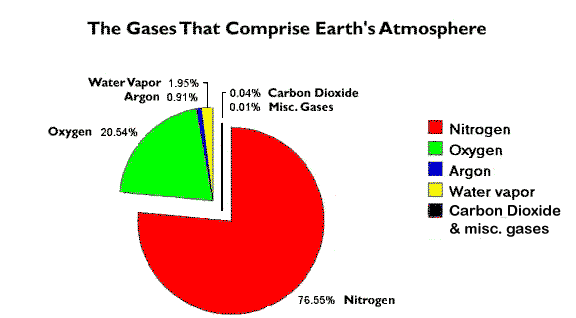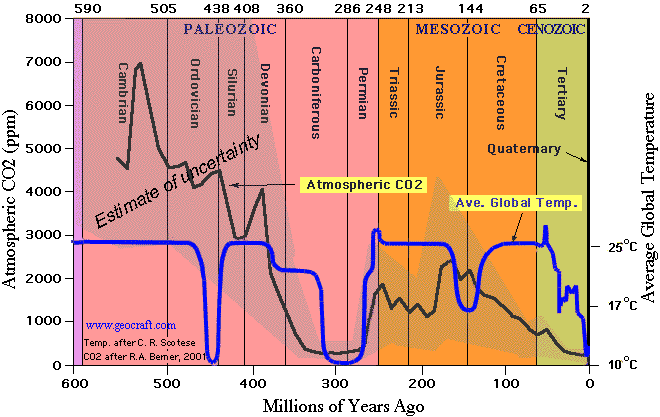How much Carbon dioxide (CO2) is in Earth's atmosphere
today?
a) 10% or greater
b)
2% to 10%
c) less
than 1/10th of 1%
You are correct!
 Carbon dioxide is such a small component of Earth's atmosphere (380 parts per
million or 0.038%) that it shows up on the chart below as only a thin line
(shown at 2x actual thickness, just so you can see it!).
Carbon dioxide is such a small component of Earth's atmosphere (380 parts per
million or 0.038%) that it shows up on the chart below as only a thin line
(shown at 2x actual thickness, just so you can see it!).
Most CO2 comes from natural terrestrial and ocean biologic
activity, and compared to former geologic times, Earth's atmosphere today
is arguably "CO2 impoverished."

 In the last 600 million
years of Earth's history only the Carboniferous Period and our present
age, the Quaternary Period, have witnessed CO2 levels less than
400 ppm.
In the last 600 million
years of Earth's history only the Carboniferous Period and our present
age, the Quaternary Period, have witnessed CO2 levels less than
400 ppm.
Global Temperature and Atmospheric CO2 over Geologic
Time
 |
| Late Carboniferous to Early Permian time (315 mya -- 270
mya) is the only time period in the last 600 million years when both
atmospheric CO2 and temperatures were as low as they are
today (Quaternary Period ).
Temperature after C.R. Scotese http://www.scotese.com/climate.htm

CO2 after R.A. Berner, 2001 (GEOCARB III)
 |
There has historically been much more CO2 in our atmosphere
than exists today. For example:
 During the Jurassic
Period (200 mya), average CO2 concentrations were about 1800 ppm
or about 4.7 times higher than today.
During the Jurassic
Period (200 mya), average CO2 concentrations were about 1800 ppm
or about 4.7 times higher than today.
 The highest concentrations
of CO2 during all of the Paleozoic Era occurred during the Cambrian
Period, nearly 7000 ppm -- about 18 times higher than today.
The highest concentrations
of CO2 during all of the Paleozoic Era occurred during the Cambrian
Period, nearly 7000 ppm -- about 18 times higher than today.
 The Carboniferous Period
and the Ordovician Period were the only geological periods
during the Paleozoic Era when global temperatures were as low
as they are today. To the consternation of global warming proponents,
the Late Ordovician Period was also an Ice Age while at the same
time CO2 concentrations then were nearly 12 times higher than today-- 4400
ppm.
The Carboniferous Period
and the Ordovician Period were the only geological periods
during the Paleozoic Era when global temperatures were as low
as they are today. To the consternation of global warming proponents,
the Late Ordovician Period was also an Ice Age while at the same
time CO2 concentrations then were nearly 12 times higher than today-- 4400
ppm.
According to greenhouse theory, Earth should have been
exceedingly hot. Instead, global temperatures were no warmer than today.
Clearly, other factors besides atmospheric carbon influence earth temperatures
and global warming.